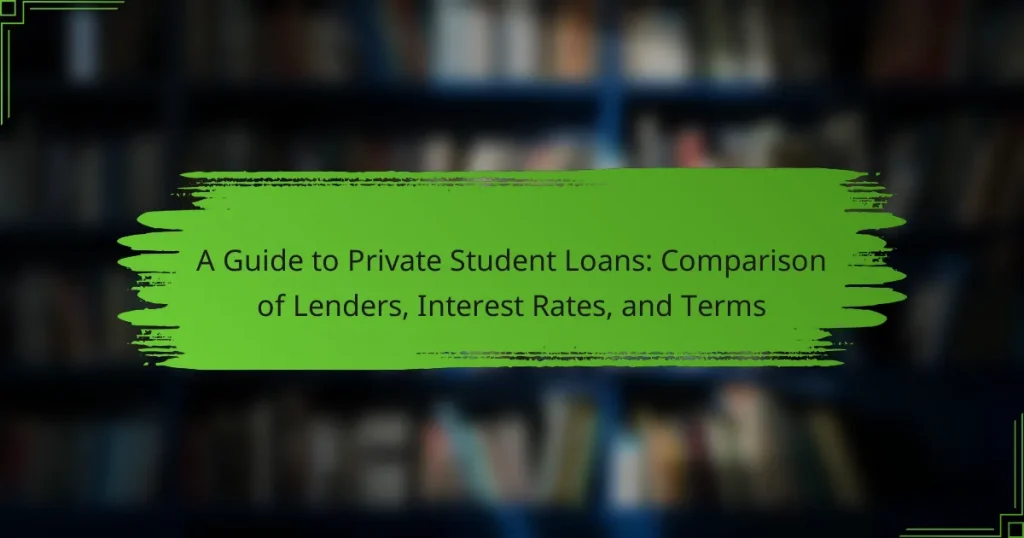
What are Private Student Loans?
Private student loans are loans offered by private lenders to help students pay for their education. These loans typically cover expenses not met by federal student loans or grants. Borrowers must apply and qualify based on creditworthiness. Interest rates can vary significantly based on the lender and the borrower’s credit profile. Unlike federal loans, private loans often do not offer flexible repayment options. Some private loans may require a co-signer for approval. Borrowers should carefully compare terms and rates from different lenders. According to the Consumer Financial Protection Bureau, private student loans accounted for approximately 7% of all student loan debt in the U.S. in 2021.
How do Private Student Loans differ from Federal Student Loans?
Private student loans differ from federal student loans primarily in their source and terms. Federal student loans are issued by the government, while private loans are provided by banks, credit unions, or other financial institutions. Federal loans generally have fixed interest rates set by the government, whereas private loans can have variable or fixed rates determined by the lender’s policies and the borrower’s creditworthiness.
Federal loans offer borrower protections such as income-driven repayment plans and loan forgiveness options, which are typically not available with private loans. Additionally, federal loans do not require a credit check for most borrowers, while private loans often require a credit assessment and may necessitate a co-signer for those with limited credit history.
According to the U.S. Department of Education, federal student loans also provide benefits like deferment and forbearance options that can help borrowers manage repayment during financial hardship. In contrast, private loans may have more stringent repayment terms and fewer flexible options.
What are the key features of Private Student Loans?
Private student loans typically offer features such as flexible repayment options, variable or fixed interest rates, and credit-based approval. They may also include benefits like deferment during school enrollment and potential for cosigner release. Lenders often provide varying loan amounts, allowing students to borrow what they need. Interest rates for private loans can be higher than federal loans, reflecting the borrower’s creditworthiness. Additionally, private loans do not have the same borrower protections as federal loans, such as income-driven repayment plans. These features make private student loans a viable option for funding education, depending on individual financial situations.
Why might a borrower choose Private Student Loans over Federal options?
Borrowers might choose Private Student Loans over Federal options for several reasons. Private loans often offer higher borrowing limits compared to federal loans. This can be essential for students attending expensive institutions. Additionally, private loans may provide more flexible repayment options. Some lenders allow borrowers to customize their repayment plans based on their financial situation. Interest rates on private loans can be lower for borrowers with strong credit. In contrast, federal loans have fixed interest rates that may be higher for some borrowers. Furthermore, private loans may offer benefits like immediate disbursement and fewer restrictions on use. These factors make private loans an attractive option for many students seeking financial assistance.
What factors should be considered when choosing a Private Student Loan?
When choosing a Private Student Loan, consider interest rates, repayment terms, and fees. Interest rates can be fixed or variable. Fixed rates remain constant, while variable rates can change over time. Compare rates from multiple lenders to find the best deal. Repayment terms vary by lender, impacting monthly payments and total interest paid. Look for options like deferment or forbearance for financial flexibility. Fees can include origination fees or prepayment penalties, which can add to the overall cost. Additionally, evaluate the lender’s customer service and borrower protections. Strong customer support can assist during repayment. Researching these factors ensures informed borrowing decisions.
How do interest rates impact the overall cost of Private Student Loans?
Interest rates significantly affect the overall cost of private student loans. Higher interest rates lead to increased monthly payments and total repayment amounts. For example, a loan of $30,000 at a 5% interest rate over 10 years results in approximately $38,000 paid back. In contrast, the same loan at a 10% interest rate leads to about $48,000 in total repayment. This demonstrates that even a small increase in interest rates can substantially raise costs. Additionally, interest rates determine how much interest accrues during the loan period. Lower rates minimize the financial burden on borrowers, making loans more manageable.
What loan terms are typically available for Private Student Loans?
Private student loans typically offer terms ranging from 5 to 20 years. Borrowers can choose between fixed and variable interest rates. Fixed rates remain constant throughout the loan term. Variable rates can change over time based on market conditions. Many lenders also provide options for deferment or forbearance. Some loans may have a grace period before repayments begin. Repayment plans can vary between lenders, affecting monthly payment amounts. The specific terms depend on the lender and the borrower’s creditworthiness.

Which lenders offer Private Student Loans?
Many lenders offer private student loans. Key lenders include Sallie Mae, SoFi, and Discover. Other notable lenders are College Ave, Citizens Bank, and Wells Fargo. Each lender has different terms, interest rates, and repayment options. For example, SoFi provides a range of flexible repayment plans. Sallie Mae offers loans for both undergraduate and graduate students. Discover provides cash rewards for good grades. Researching specific lender details is essential for informed borrowing decisions.
What are the top lenders for Private Student Loans?
The top lenders for private student loans include SoFi, Discover, Sallie Mae, and Citizens Bank. SoFi offers competitive interest rates and no fees. Discover provides cash back rewards on certain loans. Sallie Mae has flexible repayment options and a variety of loan types. Citizens Bank allows for multi-year approval, simplifying the borrowing process. These lenders are recognized for their favorable terms and customer service.
What unique features do different lenders provide?
Different lenders provide unique features tailored to borrower needs. For example, some lenders offer flexible repayment options. These options may include income-driven repayment plans. Others might provide a grace period before repayments begin. Certain lenders also offer interest rate discounts for automatic payments. Additionally, some lenders allow co-signer release after a series of on-time payments. Unique features can enhance the borrowing experience significantly. Understanding these features helps borrowers make informed decisions.
How can borrowers evaluate lender reputation and reliability?
Borrowers can evaluate lender reputation and reliability through several key methods. They should check online reviews and ratings on platforms like Trustpilot or the Better Business Bureau. Analyzing customer feedback provides insights into borrower experiences. Borrowers can also research the lender’s history and track record in the industry. Established lenders often have a longer history of reliable service. Additionally, they should verify if the lender is accredited by relevant financial authorities. Accreditation indicates compliance with industry standards. Comparing lenders’ terms and conditions can reveal transparency and fairness. Borrowers should also consult financial blogs and forums for expert opinions. Engaging with current or former borrowers can provide firsthand accounts of the lender’s reliability.
What comparison criteria should be used when evaluating lenders?
When evaluating lenders, consider interest rates, loan terms, fees, and customer service. Interest rates directly affect the total cost of borrowing. Loan terms determine the repayment duration and monthly payment amounts. Fees can include origination fees, late payment fees, and prepayment penalties. Customer service quality impacts the overall borrowing experience. Additionally, check for borrower benefits, such as interest rate reductions for automatic payments. Compare these criteria across multiple lenders to make an informed decision.
How do interest rates vary between lenders?
Interest rates vary between lenders due to factors such as credit risk, loan type, and market conditions. Lenders assess the borrower’s creditworthiness differently, leading to varying rates. For example, a borrower with a high credit score may receive lower rates from one lender compared to another. Additionally, different loan types, such as fixed or variable rates, influence the interest charged. Market conditions, including the Federal Reserve’s rates and economic trends, also impact lender pricing strategies. As a result, borrowers may find significant differences in interest rates when comparing offers from multiple lenders.
What are the different repayment options offered by lenders?
Lenders offer various repayment options for private student loans. These options typically include immediate repayment, interest-only repayment, and deferred repayment. Immediate repayment requires borrowers to start paying both principal and interest right after disbursement. Interest-only repayment allows borrowers to pay only the interest during school or a grace period, with principal payments starting later. Deferred repayment lets borrowers postpone all payments until after graduation. Each option varies by lender, and borrowers should review terms carefully to choose the best fit for their financial situation.

What are the costs associated with Private Student Loans?
Private student loans typically involve several costs. These costs include interest rates, origination fees, and potential late fees. Interest rates can vary significantly based on the lender and the borrower’s credit profile. Rates may range from 3% to 12% or higher. Origination fees are charged by some lenders and can be around 1% to 5% of the loan amount. Late fees can apply if payments are not made on time, often around $15 to $30. Borrowers should also consider the total repayment amount, which includes both principal and interest over the loan term. Understanding these costs is crucial for making informed borrowing decisions.
How do interest rates affect the total repayment amount?
Interest rates directly impact the total repayment amount of loans. Higher interest rates increase the overall cost of borrowing. For example, a loan of $10,000 at a 5% interest rate repaid over 10 years results in approximately $12,500 total repayment. Conversely, at a 10% interest rate, the total repayment rises to about $16,000. This demonstrates how even a small increase in the interest rate can significantly raise the total repayment amount. The longer the loan term, the more pronounced the effect of interest rates on total repayment. Thus, understanding interest rates is crucial for borrowers to manage their repayment obligations effectively.
What is the difference between fixed and variable interest rates?
Fixed interest rates remain constant throughout the life of a loan. This means borrowers pay the same interest rate for the entire duration. Variable interest rates can fluctuate over time. They are often tied to an index, such as the prime rate. When the index changes, the interest rate on the loan may increase or decrease. Fixed rates offer predictability in monthly payments. Variable rates can lead to lower initial payments but may increase over time. According to the Consumer Financial Protection Bureau, fixed rates are generally safer for long-term loans. In contrast, variable rates may be advantageous in a declining interest rate environment.
How can borrowers estimate their monthly payments?
Borrowers can estimate their monthly payments by using an online loan calculator. This tool requires inputting the loan amount, interest rate, and loan term. The calculator then provides an estimated monthly payment. For example, a $30,000 loan at a 5% interest rate for 10 years results in a monthly payment of approximately $318. Additionally, borrowers should consider potential fees and insurance that may affect the total payment. Using these calculators helps borrowers plan their finances effectively.
What additional fees may be associated with Private Student Loans?
Private student loans may have several additional fees. Common fees include origination fees, which can range from 1% to 5% of the loan amount. Late payment fees may also apply if payments are not made on time. Some lenders charge prepayment penalties for paying off the loan early. Additionally, there could be fees for deferment or forbearance requests. These fees vary by lender and can significantly affect the total cost of the loan. Always review the loan agreement for specific fee details before borrowing.
What are common fees borrowers should be aware of?
Common fees borrowers should be aware of include origination fees, late payment fees, and prepayment penalties. Origination fees are charged by lenders for processing a loan application. These fees typically range from 1% to 5% of the loan amount. Late payment fees occur when borrowers miss a scheduled payment. These can vary by lender but often range from $15 to $50. Prepayment penalties may apply if borrowers pay off their loan early. Not all lenders impose this fee, but it is important to check the loan agreement. Understanding these fees helps borrowers make informed decisions.
How can borrowers minimize fees when taking out a loan?
Borrowers can minimize fees when taking out a loan by shopping around for the best rates and terms. Comparing multiple lenders allows borrowers to identify lower fees and better offers. They should also consider negotiating fees with lenders, as some may be willing to waive or reduce them. Additionally, borrowers can opt for loans with no origination fees or prepayment penalties. Maintaining a good credit score can also lead to lower fees, as lenders often offer better terms to creditworthy borrowers. Understanding the loan agreement in detail helps borrowers avoid unexpected fees. Finally, choosing a shorter loan term may reduce overall fees, as interest accumulates over time.
What tips can help borrowers make informed decisions about Private Student Loans?
Borrowers can make informed decisions about private student loans by researching lenders thoroughly. Compare interest rates, terms, and repayment options from multiple lenders. Look for lenders that offer flexible repayment plans and deferment options. Understand the differences between fixed and variable interest rates. Read customer reviews and ratings to gauge lender reliability. Check if the lender offers any borrower benefits, such as interest rate reductions for automatic payments. Review the loan agreement carefully before signing. Ensure that you fully understand all fees associated with the loan.
What resources are available for comparing loan options?
Online loan comparison websites are available for comparing loan options. These resources allow users to evaluate various lenders side by side. Popular sites include LendingTree, Bankrate, and Credible. They provide information on interest rates, terms, and fees. Many of these platforms offer personalized quotes based on user input. Additionally, financial blogs and forums can provide insights from other borrowers. Government websites, like the Federal Student Aid, also offer guidance on loan types. Using these resources can help borrowers make informed decisions.
How can borrowers improve their chances of securing favorable terms?
Borrowers can improve their chances of securing favorable terms by maintaining a strong credit score. A credit score above 700 typically qualifies for better interest rates. Timely bill payments and low credit utilization positively influence credit scores. Additionally, borrowers should consider a co-signer with good credit, which can enhance loan applications. Research shows that loans with co-signers often have lower rates. Borrowers should also shop around and compare offers from multiple lenders. This practice allows them to find the best terms available. Lastly, demonstrating stable income or employment history can further strengthen their application.
Private student loans are financial products offered by private lenders to assist students in covering educational expenses not addressed by federal loans or grants. This article provides a comprehensive overview of private student loans, detailing their key features, differences from federal loans, and factors to consider when choosing a lender. It also compares interest rates, repayment options, and associated costs, while highlighting top lenders and their unique offerings. By understanding these aspects, borrowers can make informed decisions about financing their education effectively.




